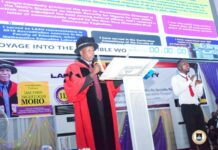The Federal Government has said that it did not put an age restriction on students who want to write the examinations of the West African Examination Council and National Examination Council.
The Minister of State for Education, Dr. Tanko Sununu, said this on Friday when he spoke with newsmen in Abuja.
The position of the Federal Government stemmed from the report that the Minister of Education, Prof. Tahir Mamman, that no student under 18 years of age can gain admission into the university from next year.
Sununu, who spoke with newsmen on the activities to mark the 2024 World Literacy Day, with the theme: “Promoting Multilingual Education: Literacy for Mutual Understanding and Peace,” said the statement by Mamman was misinterpreted.
He said that what the statement translates into is that while students can write examinations organised by NECO and WAEC, they cannot sit for the Unified Tertiary Matriculation Examination organised by the Joint Admissions and Matriculation Board to gain entrance into tertiary institutions.
He said: “As regards this matter, we have made ourselves clear in different fora.
“But the issue kept recurring here and there.
“Actually, nobody among the two of us, the Minister of Education, Prof. Tahir Mamman, nor the Minister of State, stated anything about the age limit for WAEC, NECO or NABTEB.
“People just pick up some remarks the Minister made, misinterpreted the statements to imply that age restriction has been placed for WAEC and NECO examinations.
“What we have been mentioning in the past was the entry age for university. Candidates sitting for the UTME. We have made this clear several times.
“And this is in line with the National Policy on Education.
“The document stated that a child is expected to enter primary school at six years, and he’s expected to spend six years in that school, making it 12 years, three years each in junior and senior secondary schools, making it 18 years.
“That’s what is contained in the National Policy on Education document.
“This is directly or otherwise related to the theme of this year’s World Literacy Day.
“The policy further stated that a child should learn in the language of the immediate environment or mother tongue up till Primary 3 before English Language could be introduced in subsequent years.
“That has facilitated learning at that level because you can easily communicate.”














